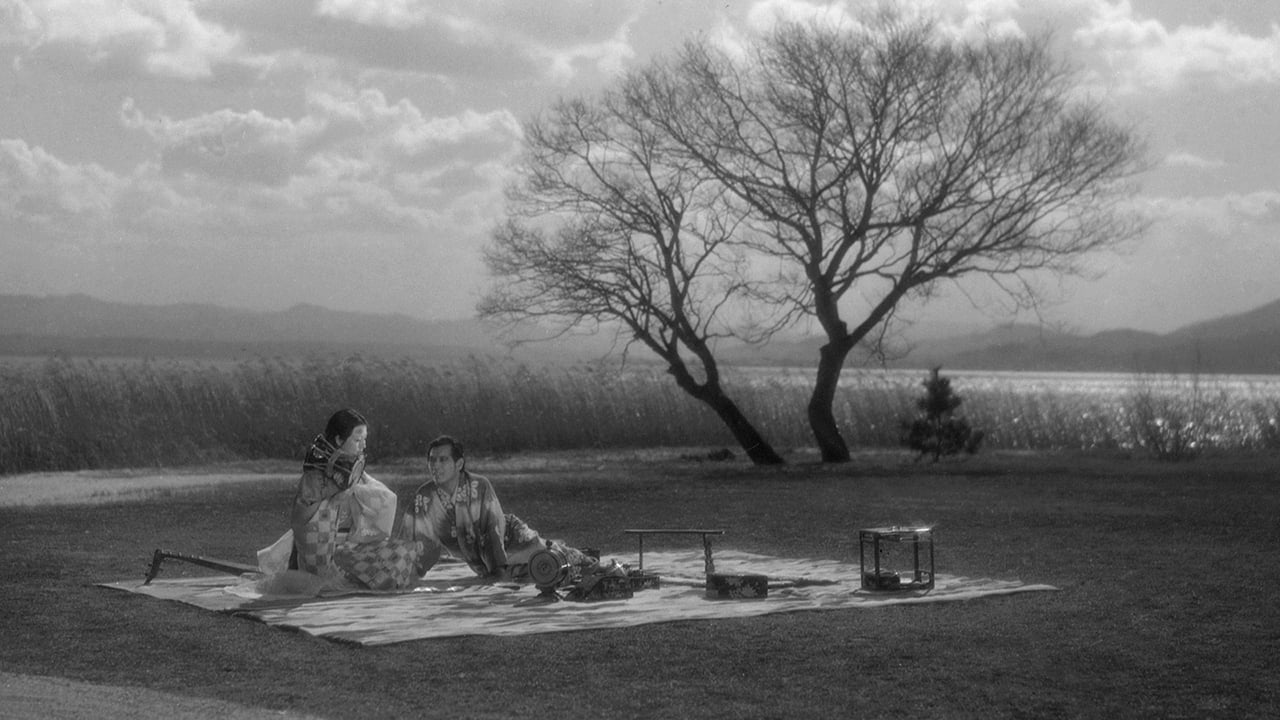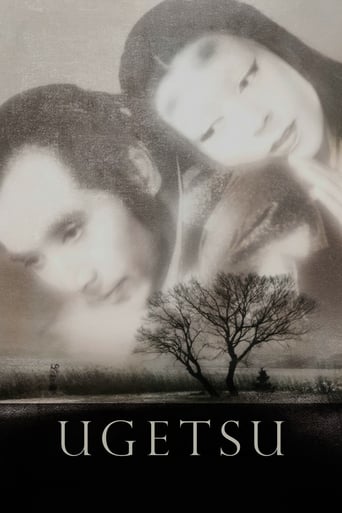

This is a buddhist film, just not a secular buddhist film. I think the message Kenji Mizoguchi wanted to convey was that living in the present and appreciating what you have is the only way to reach nirvana. the scene where Tôbei, Genjurô and their wives are making their way to Nagahama in a river so foggy that they can only see directly in front of them is an allusion to their ignorance of the suffering they will endure. unfortunately, despite the two wives being central to the story, they only serve as accessories to the two brother's Tôbei and Genjurô's development as characters. the movie's message is a very moral one, yet one I personally don't agree with (sometimes what you have is really paltry) which makes the movie's subpar cinematography and indistinct music rather blatant. It's not the worst Japanese drama of it's time, but it doesn't hold a torch to innovators like Kurosawa and Kobayashi's work. Ugetsu in my opinion is overrated and hardly watchable a second time.
... View MoreDirector Kenji Mizoguchi's film is based on the 18th century supernatural stories in the Ugetsu Monogatari (Tales of Moonlight and Rain), and takes place during civil warfare in 16th century Japan. Despite the concerns of his wife, a potter seeks to take risks and profit from the chaos of war. His friend has the desperate ambition to become a samurai, despite not being of the right class or even possessing the armor necessary. It's this desire for money and fame, as opposed to being cautious and content, that will prove to be the men's undoing. The potter will meet a young woman from a market who turns out to be an alluring phantom, a Japanese Circe of sorts, and so the desire for sensual pleasure is added to these temptations.Machiko Kyo plays Lady Wakasa, the temptress, and it's interesting as her true nature and emotions are gradually revealed. Unfortunately the role of the would-be samurai is comically overacted by Eitaro Ozawa, which took away from my enjoyment. There are some beautiful shots, such as a boat slowly disappearing into the mist and fog, as well as great moments, such as when the samurai reunites with his wife under very different circumstances (which I won't spoil), and the film is certainly well done and worth watching. However, the story is a bit too much of a morality tale for my taste: the men put their wives at risk through the temptations of money, fame, and sex, and, well, of course bad things happen. The film clearly has a place in film history, but I find it hasn't aged as well as other classics.
... View MoreA fantastic tale of war, love, family and ambition set in the midst of the Japanese Civil Wars of the sixteenth century.Along with Akira Kurosawa's 1950 film "Rashomon", "Ugetsu" is credited with having popularized Japanese cinema in the West. And you can see why, with this strong, sweeping tale of a family struggling in the middle of war. The plot is almost epic (albeit brief), and the film ranges from the greatest joys to the worst sorrows within a short time.Donald Richie called it "one of the most perfect movies in the history of Japanese cinema" and especially praised the beauty and morality of the film's opening and closing shots. He is quite right, and this film really explains how important cinematography can be.
... View More"Onibaba" led me to "Ugetsu," an earlier, even more critically acclaimed film from the Japanese New Wave. Despite what a few websites and reference books told me, "Ugetsu" isn't a true horror film. Instead it's a simple moral fable and costume drama that slowly reveals itself to have a supernatural element.Also set during one of Japan's civil wars, this one in the 16th century, "Ugetsu" focuses on a family trying to survive amidst the turmoil. Genjuro is a pottery maker, struggling to feed his wife Miyagi and his young son. Tobei dreams of being a samurai, even if his wife Ohama suggests he focuses on the here and now. After a particularly profitable day in the city, Genjuro returns home with a handful of silver and a beautiful kimono for his wife. "Ugetsu" rather heavy-handedly and bluntly lays out it themes right then and there, with Miyagi telling her husband it isn't the gifts that make her happy. After soldiers raid the two, the family is forced to leave their village. The husband leave their wives on the river shore as they go off in search of profits.Both men's dreams end up coming true. Tobei stumbles upon the corpse of a high-ranking enemy general, claiming the kill as his own, and being promoted to a high-ranking position, finally becoming a powerful, respected samurai. Genjuro, meanwhile, with his pottery catches the attention of a mysterious princess. The princess more-or-less adopts him as her husband, allowing the man to live a life of wealth and relaxation. Meanwhile, Ohama is forced into prostitution and Miyagi flees from village to village, narrowly escaping detection by rampaging soldiers.The supernatural element of "Ugetsu" comes from the subplot featuring the princess. Always clothed in white and with distinctive make-up on her face, she cuts an uncanny figure. The manor she lives in is weirdly isolated. Probably the film's spookiest moment comes when a strange voice starts to reverberate out of an empty samurai armor, the ghost of the girl's father speaking through it. When the townsfolk are freaked out by the mention of the princess' name, it's easy to figure out where this is going. Yep, Genjuro has fallen in love with a ghost, one that gets rather possessive. When he reveals to the princess that he's married, the spirit reacts Badly. That conclusion is "Ugetsu" at its best, the man chased by spectres through an abandoned home amidst a ravaged, ruined battlefield, his body painted with Buddhist symbols.The film's resolution is chilly and melancholy, the men returning home broken but perhaps better people. The messages of "Work hard," "Appreciated what you have," and "Don't be greedy" are simple and obvious. That's not what makes "Ugetsu" memorable. Kenji Mizoguchi's direction is moody, frequently bathing the stark tableus in fog and shadow. All the performances are good though the old woman playing the ghost princess' servant is probably my favorite. Her monologue, imploring the man to stay and explaining their origins, is spoken musically, like a strange poem. So "Ugetsu" is quite good even if it's not actually a horror film. I should do more research next time before Netflixing something.
... View More